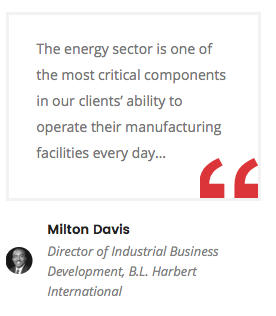A Conversation with Senator Cam Ward
 Recently, EIA had the opportunity to talk with Sen. Cam Ward, who represents State District 14, where we discussed a wide variety of energy-related topics. Below is the Q&A from that visit:
Recently, EIA had the opportunity to talk with Sen. Cam Ward, who represents State District 14, where we discussed a wide variety of energy-related topics. Below is the Q&A from that visit:
You serve on numerous committees, many of which focus on energy. You are even chairman of the Joint Oversight Committee for Energy Policy and chairman of the national/international Energy Council, CLEER. How/why did you develop an affinity for energy?
Our economy is diverse. It is much more than spreadsheets and numbers. Our energy production is an important part of the Alabama economy. After visiting with other states, I realized how complex the issue is and found myself interested in how technology is making our state even more competitive.
President Trump has loosened some of the restrictions on coal and has begun deregulation. How will this affect Alabama’s economy? President Trump’s deregulation efforts are one of the single biggest drivers of the uptick in our economy. For eight years, we had to deal with regulations that dominated our energy industry with more paperwork than jobs. This change has dramatically improved production as well as delivery.
What else can we expect to see from President Trump and/or Secretary Perry with respect to energy policy? How does this affect Alabamians? There are several areas of improvement in the Trump administration’s energy policy that will benefit our nation. Improved pipeline delivery infrastructure from Canada to gulf coast refineries will increase domestic supply of oil. Also, the easing of restrictions for off-shore drilling will move the United States closer to complete energy independence. One particular benefit of the Trump administration’s energy and environmental policy will be the easing of restrictions for the construction of the roads. For the last eight years, Alabama has had a terrible time even getting started with new road projects due to the overwhelming number of environmental regulations involved in starting any project.
Unfortunately, terrorist attacks are on the rise. Many entities have and are continuing to put safeguards in place to protect the welfare of the general public. With that in mind, are you comfortable with the security of our grid? I am worried about the security of our grid. This is not due to the fault of the private sector but my concern is how rapidly so many threats to our grid system are growing. Countries such as North Korea, China and Russia are constantly looking at ways to disrupt our grid system. This threat is greater than any military aggression that our nation is faced with because it is going to be a daily challenge going forward. Unlike military developments, cyber-security does not change year-to-year but instead day-to-day. This will require both the public and private sectors to greatly increase our investment in our technology and security measures.
Modular reactors have been talked about for years as the “new” nuclear power plant. What are your thoughts on them? Once the technology is in place to provide more assurance of their safety, more and more use of modular reactors will likely take place. Two issues are key. One, with current LNG and natural gas prices being so low, there is little incentive to invest in a new energy source. Second, security will always be a driving factor in determining whether or not this technology is far enough along to include it in our national energy portfolio.
There seems to be an abundance of LNG in the market, which is a factor in low prices. How long do you see this continuing? I believe the low prices in the LNG market are here to stay for a while. The abundance of resources both in the United States and Canada represent a sector of the energy economy that could continue to keep prices lower for at least the next decade barring international conflict.
Do you foresee any incentives for the continued development of wind/solar as power sources? Alabama’s environment really doesn’t lend itself to solar or wind as a dominant source of energy production. Both will be an integral part of our energy economy but will likely be more complimentary rather than dominant resources. Incentives will most likely be more focused on the improvement and development of further integration of wind and energy into the grid system.

